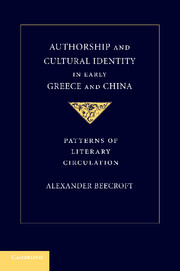Book contents
- Frontmatter
- Contents
- Acknowledgments
- Introduction
- 1 Explicit Poetics in Greece and China: Points of Divergence and Convergence
- 2 Epic Authorship: The Lives of Homer, Textuality, and Panhellenism
- 3 Lyric Authorship: Poetry, Genre, and the Polis
- 4 Authorship between Epic and Lyric: Stesichorus, the Palinode, and Performance
- 5 Death and Lingerie: Cosmopolitan and Panhuaxia Readings of the Airs of the States
- 6 Summit at Fei: The Poetics of Diplomacy in the Zuozhuan
- 7 The Politics of Dancing: The Great King Wu Dance and the Hymns of Zhou
- Conclusion: Scenes of Authorship and Master-Narratives
- Bibliography
- Index of Passages Cited
- General Index
2 - Epic Authorship: The Lives of Homer, Textuality, and Panhellenism
Published online by Cambridge University Press: 03 May 2010
- Frontmatter
- Contents
- Acknowledgments
- Introduction
- 1 Explicit Poetics in Greece and China: Points of Divergence and Convergence
- 2 Epic Authorship: The Lives of Homer, Textuality, and Panhellenism
- 3 Lyric Authorship: Poetry, Genre, and the Polis
- 4 Authorship between Epic and Lyric: Stesichorus, the Palinode, and Performance
- 5 Death and Lingerie: Cosmopolitan and Panhuaxia Readings of the Airs of the States
- 6 Summit at Fei: The Poetics of Diplomacy in the Zuozhuan
- 7 The Politics of Dancing: The Great King Wu Dance and the Hymns of Zhou
- Conclusion: Scenes of Authorship and Master-Narratives
- Bibliography
- Index of Passages Cited
- General Index
Summary
The notionally foundational works of Greek and Chinese literature, that is to say Homeric epic and the Canon of Songs, differ in very obvious ways in form and content, but both feature self-effacement by the poets who created them. I discuss the somewhat different Chinese version of this in Chapter 5; here I discuss authorial self-reference in Homeric epic. The poet of the Odyssey inserts himself into the first line of his epic, ἄνδρα μοι ἔννεπε, Μοῦσα, “Narrate to me, muse,” but does so in the dative case. He is not the singing subject of his poem, but rather his indirect object, an interested party to it. His singular self-reference is devoid of identity and personality, and serves in fact only to point to his invisibility. The same is true of the Iliad; the invocation at the beginning of the Catalogue of the Ships (ἔσπετε νῦν μοι Μοῦσαι, “Tell me now, Muse,” Iliad 2.484) reminds the audience of the poet's presence, but evacuates that presence of any specific identity. To understand why this should be so requires a slight digression.
Whatever our personal views on the composers and compositional practices of Homeric epic, few would now dispute the centrality of performance for the circulation and appreciation of this category of verbal art, and indeed one of the major projects of contemporary Homeric scholarship must be to integrate the consequences of this turn to performance into our ideas about the texts we possess.
- Type
- Chapter
- Information
- Authorship and Cultural Identity in Early Greece and ChinaPatterns of Literary Circulation, pp. 61 - 105Publisher: Cambridge University PressPrint publication year: 2010



